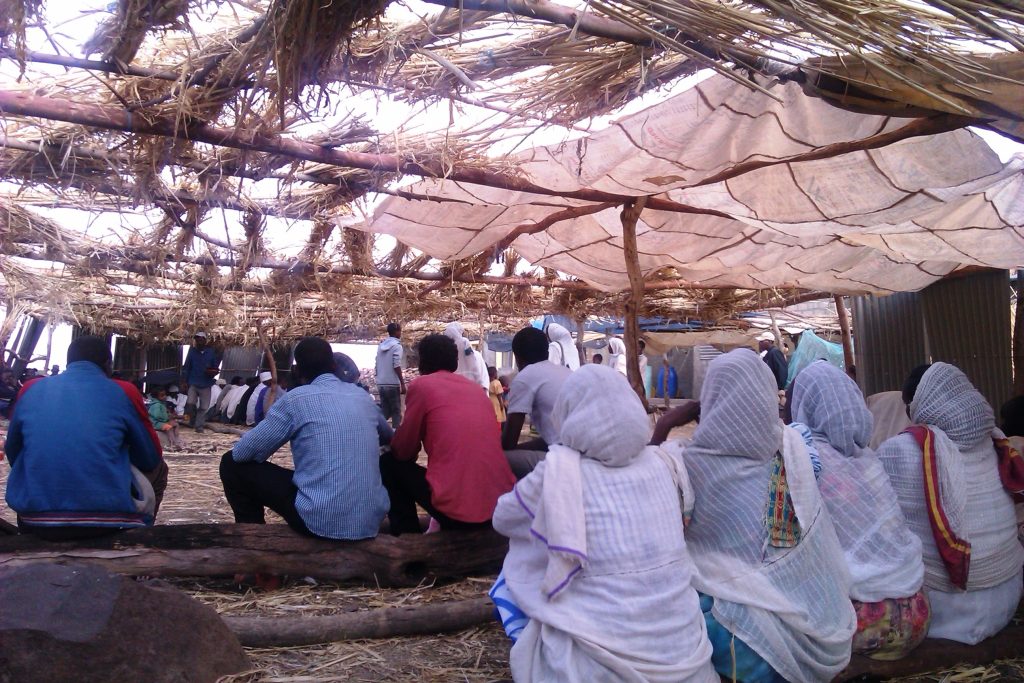This language is currently in review and will be available soon!

SOAS University of London has made accessible open access Dr Romina Istratii’s PhD thesis titled: Gender and development through local epistemologies : understanding conjugal violence among orthodox Tawahedo Christians in northern Ethiopia and implications for changing attitudes and norms within local worldviews. The thesis presents a study of conjugal abuse from the Ethiopian Orthodox Täwahәdo community of Aksum in Tigray region. The fieldwork for the study was completed in 2016-2017 in two villages located in the surroundings of Aksum city with the aim of exploring definitions and attitudes of conjugal violence within the local community’s religio-cultural belief system and socio-cultural realities.
The research was motivated by epistemological concerns emanating from gender theoretical constructs employed widely in international development, including also studies of intimate partner violence (IPV). The first concern emanated from the field’s historical reliance on gender theories that have been disproportionately informed by western gender metaphysics. This has combined with tendencies to neglect religious parameters in the study of IPV, assuming typically gender-based explanations that do not heed sufficiently the diverse cosmological contexts in which IPV manifests. Without denying its possible gendered underpinnings, the study proposed that the investigation of IPV should be guided by beliefs and knowledge as embodied by local populations. Consequently, the author attempted a gender-sensitive analysis of conjugal abuse in the countryside of Aksum that relied on the local cosmological and socio-cultural system to formulate conceptual repertoires for gender and conjugal abuse and to identify how these were accommodated within the local religio-cultural cosmology. Ethnographic investigations were combined with a theology-informed analysis from ‘within.’ Tigray was selected for study because it has combined a doctrinally non-violent faith with high levels of wife-hitting and tolerance of it, as reported in Ethiopian demographic surveys in recent years. A primary concern was to explore the interlinkages between the folklore Christian tradition and conjugal abuse realities and attitudes to identify whether and how theology-informed and clergy-centred interventions could be relevant for this society. This reflected the argument of the author that interventions should emanate from local belief and knowledge systems and be enacted through resources that are likely to make sense to and have some credibility with the local population. The research revealed complex intertwinements between religious parameters and conjugal abuse, indicating the potential role of apostolic theology and clergy discourses in addressing conjugal abuse under specific conditions.
Dr Istratii outlined openly her personal motivations to undertake this work in her monograph, an excerpt from which is reproduced below:
“The objectives of this book are undoubtedly informed by my own worldview and background. Born in Moldova, my family and I immigrated to Greece after the collapse of the Soviet Union. Both these societies have differentiated themselves from western modernity by ascribing historically to an Eastern Orthodox worldview. They also belong to a region that experienced hundreds of years of Ottoman occupation. While this cannot compare to the exceptionally dehumanising experience of colonialism, this historical legacy has made me deeply sympathetic to all peoples and communities who have experienced military, economic and cultural impositions. I have developed the approach described in the book from the point of view that every people should be allowed to define themselves, exemplified in my decision to let my research participants speak as much as possible in their own terminology. This explains also my choice to engage with theory-making only minimally in the ethnographic chapters. As an ‘outsider’, I do not consider it my task to theorise my findings for ‘improving’ the discipline of Ethiopian gender studies, which local researchers are more equipped to undertake. However, as a relative ‘insider’ to the local religious tradition, I have been keen to ensure that Eastern Christian traditions are explored within their proper theological and historical contexts and are leveraged in the alleviation of gender-related issues as appropriate and feasible in each society.”
The full thesis can be downloaded from SOAS Research Online. The thesis is published under the Creative Commons Attribution-NonCommercial-NoDerivatives 4.0 (CC BY-NC-ND 4.0) license and can be re-shared for all non-commercial purposes.